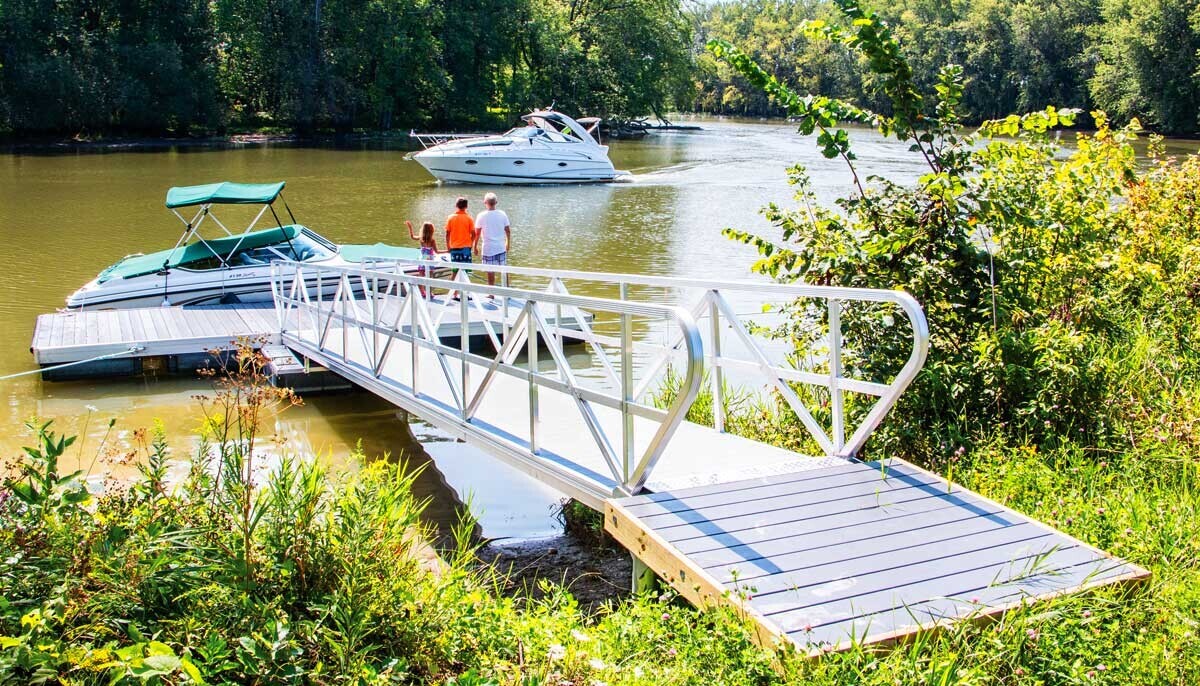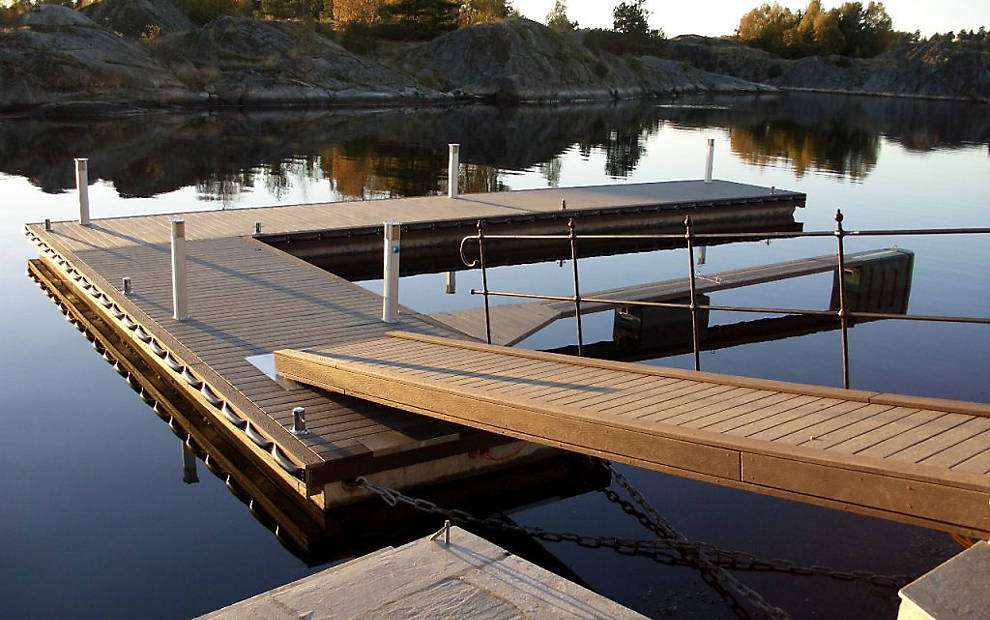Find the Perfect Floating Dock Builder to Bring Your Waterside Vision to Life
Find the Perfect Floating Dock Builder to Bring Your Waterside Vision to Life
Blog Article
Floating Docks: The Suitable Selection for Versatile Water Gain Access To
Floating docks existing a compelling option for a variety of water accessibility requires, offering adaptability that goes beyond traditional mooring options. Their ability to adjust to ever-changing water levels while guaranteeing stability and security makes them particularly useful for both recreational and business applications. In addition, the modular nature of floating docks promotes customization, accommodating specific requirements. However, the nuances of installation and maintenance, alongside the variety of applications, warrant a closer evaluation to totally value their prospective benefits and ramifications for waterway access strategies.
Advantages of Floating Docks
Floating docks offer various benefits that enhance water access for various applications. Their capability to drop and rise with transforming water levels makes them specifically helpful in environments with fluctuating trends or seasonal variations. This flexibility guarantees that vessels can easily tie without worry for the water's depth, supplying a trustworthy platform for leisure, industrial, and commercial uses.
Additionally, floating docks are usually constructed from long lasting products that resist rust, making them ideal for long-term use in aquatic settings. Their installation is usually much less intrusive than standard set docks, lowering the ecological impact and assisting in quicker implementation (dock company). This adaptability allows for easier moving or reconfiguration according to customer needs or environmental changes
Security is one more vital benefit; floating docks can offer stable access for individuals disembarking or boarding from watercrafts and reduce the danger of accidents associated with unpredictable surface areas. In addition, they can be created to suit a selection of devices, such as cleats and fenders, improving functionality. Overall, floating docks stand for an effective remedy for enhancing water gain access to across varied markets while advertising security and environmental sustainability.

Sorts Of Floating Docks
Different kinds of floating docks provide to different requirements and environments, each created with specific attributes to enhance capability. One of the most usual kinds consist of modular docks, which include interlacing sections that permit very easy customization and growth. These docks are suitable for recreational use, as they can be customized to fit numerous boat sizes and water conditions.
One more preferred option is the stationary floating dock, which stays secured in place but floats with altering water degrees. floating dock builder. This type is specifically matched for locations with minimal tidal fluctuations, providing steady accessibility for angling or swimming. In addition, there are drive-on docks, which include a sloped style that enables watercrafts to conveniently drive on and off, making them ideal for individual boat and smaller sized vessels
For commercial applications, heavy-duty floating docks are readily available, constructed from reinforced materials to withstand significant loads and severe marine atmospheres. Environmentally friendly floating docks make use of lasting materials and styles to lessen environmental impact, frequently incorporating attributes like plant life to support local wildlife. Recognizing the different types of floating docks guarantees that users can choose one of the most proper solution for their certain needs.
Setup Refine Overview
A successful setup of floating docks needs careful preparation and interest to detail to make certain ideal efficiency and security. The initial action involves examining the website conditions, consisting of water deepness, current, and prospective challenges. This analysis notifies the selection of the proper dock materials and style tailored to the particular environment.
Following, obtaining needed permits is essential, as numerous territories have policies regarding building on water bodies. The installation can proceed when permissions are protected. Begin by preparing the structure, which may include anchoring systems or pilings customized to the dock kind and helpful resources local problems.
Complying with the structure setup, construct the dock sections according to producer requirements. Ensure that all elements are firmly fastened and lined up to stand up to ecological stresses. Position the dock in the assigned location, guaranteeing it is degree and stable.

Upkeep Tips and Ideal Practices
After the installment process is complete, ongoing upkeep plays an essential duty in making sure the longevity and capability of floating docks. Regular inspections need to be performed to determine any signs of wear, damage, or damage - floating dock company. Check for any kind of loose installations, fractures, or separation in the dock areas, as these can endanger structural honesty
Cleaning up the dock is important click for info to get rid of debris, algae, and various other build-up that can impact its appearance and security. Make use of a mild pressure wash occasionally to keep tidiness without creating damages to the surface area. Furthermore, applying a safety sealant every couple of years can aid improve durability and resist environmental wear.
Take notice of the mooring lines and anchors, guaranteeing they are protected and free from rust. Change any type of degraded parts immediately to stay clear of dangers. Seasonal adjustments might also be needed; throughout extreme weather problems, repositioning or reinforcing the dock can prevent damages.
Applications for Floating Docks
Floating docks offer a wide variety of applications, accommodating both business and leisure requirements. In leisure settings, they provide seamless accessibility to waterways for activities such as boating, angling, and swimming. Their adjustable nature enables installation in differing water degrees, making sure secure and secure gain access to despite tidal fluctuations.
Readily, floating docks are indispensable for marinas and beachfront organizations. They facilitate the docking of vessels, enabling efficient discharging and packing of goods. Their modular style enables easy development or reconfiguration to fit transforming business demands, making them suitable for watercraft rentals, excursion operations, or angling charters.
Additionally, floating docks are utilized in ecological applications such as aquatic study and habitat remediation. They can work as platforms for scientific studies, keeping an eye on water top quality, or carrying out wildlife studies without troubling sensitive communities.
In commercial contexts, floating docks are employed in building and construction jobs, giving accessibility to hard-to-reach locations for equipment and personnel. Their adaptability, durability, and very little effect on the atmosphere make them an optimal selection for a variety of applications, boosting both performance and accessibility in various water-based settings.
Final Thought
Finally, floating docks represent an optimal service for diverse water gain access to needs, owing official statement to their adaptability, sturdiness, and modular layout. These frameworks promote safe mooring for numerous applications while lessening ecological effect throughout setup. The minimized upkeep needs further improve their usefulness. Thus, floating docks act as an important possession for recreational, industrial, and ecological jobs, making sure reputable accessibility to waterways and promoting sustainable practices in marine settings.
Floating docks present an engaging option for a selection of water accessibility needs, supplying flexibility that goes beyond traditional mooring options.Floating docks deal many advantages that improve water access for various applications. On the whole, floating docks represent an effective remedy for boosting water accessibility across varied fields while promoting safety and security and environmental sustainability.
One more preferred choice is the stationary floating dock, which remains secured in place but floats with altering water levels.In verdict, floating docks represent an ideal option for diverse water accessibility requires, owing to their versatility, longevity, and modular layout.
Report this page